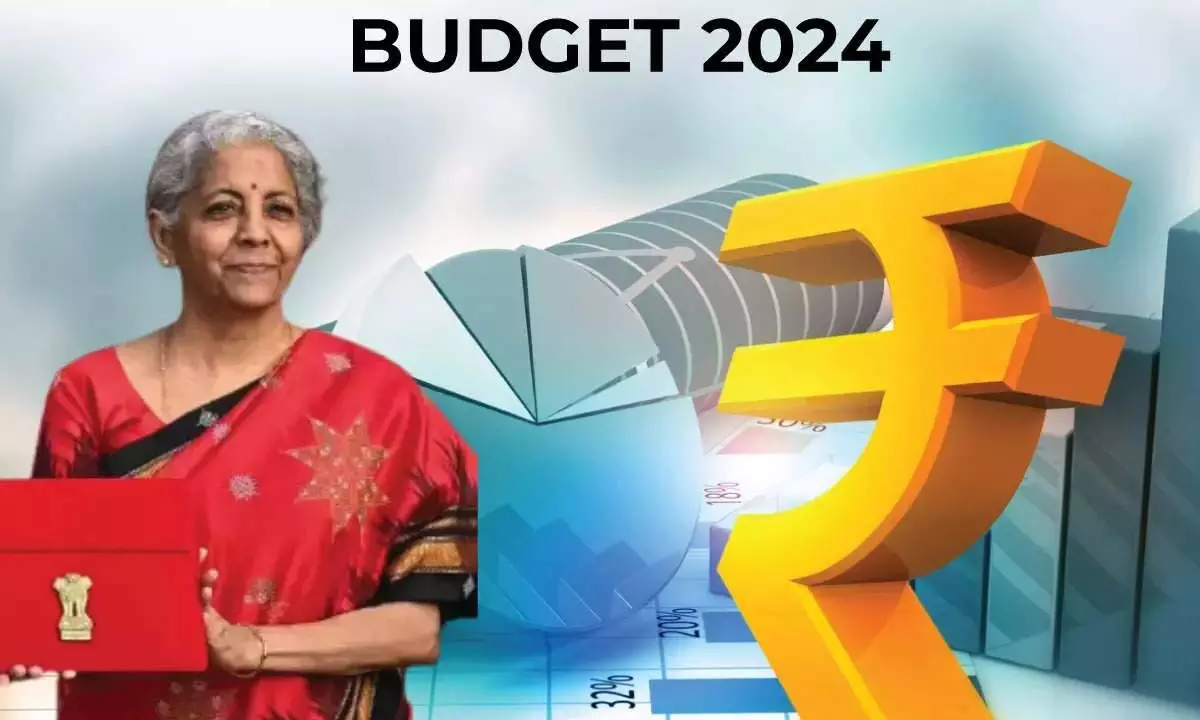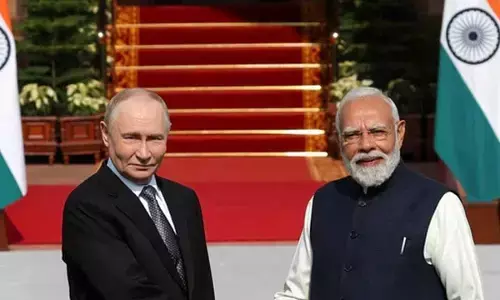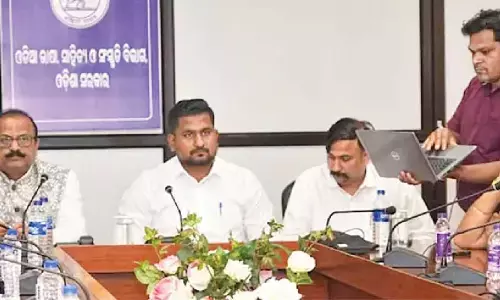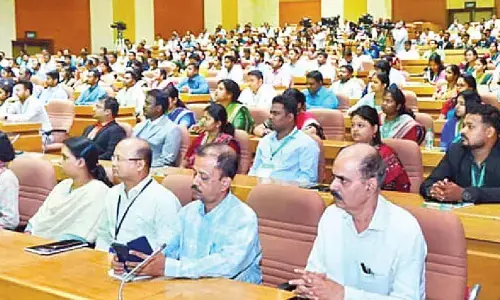Union Budget: From Finance, Education, to Healthtech, here is what the industry leaders have to say

Union Finance Minister Nirmala Sitharaman tabled the budget for the 7th consecutive time in the Modi 3.0 government.
Bengaluru: Union Finance Minister Nirmala Sitharaman tabled the budget for the 7th consecutive time in the Modi 3.0 government. The budget emphasizes nine key priorities: agricultural productivity and resilience, employment and skilling, social justice, urban development, energy security, infrastructure, innovation, and next-generation reforms. Additionally, it reinforces previously announced initiatives to accelerate progress towards the goal of Viksit Bharat, ensuring robust implementation and advancement in various sectors over the next five years.
The Founder and CEO, 4Thoughts Finance Swati Saxena said, “The Indian economy is set to embark on a transformative journey, propelled by a masterful blend of growth, strategic foresight, and robust investment. The Government has crafted an exemplary roadmap for the nation's comprehensive development, with a primary focus on enhancing infrastructure and advancing employment and youth upskilling. The Budget 2024 has set the stage for a transformative leap in India's economic and financial landscape. The streamlining of Foreign Direct Investment regulations, is going to add on the ease of doing business with a clear emphasis on utilizing the Indian Rupee for international ventures, marks a pivotal shift. Employment linked upskilling through schemes as a part of the PM’s scheme is expected to benefit 2.1 lakh youth in the country. Along with job creation in the manufacturing sector will be incentivized through a scheme linked to the employment of first-time employees, it marks a positive step towards a better employment opportunity and a stronger economy.
She said, The MSME sector has received a shot in the arm with the credit guarantee schemes, facilitating term loans for MSMEs for the purchase of machinery and equipment without collateral and guarantee. This guarantee fund will provide guarantees of up to Rs 100 crore. The increase in long-term Capital Gains tax from 10% to 12.5% introduces a modicum of uncertainty for equity investors, although the impact on governmental revenue remains relatively modest.
Startups stand to gain significantly from the abolition of the Angel Tax, thereby facilitating increased funding from angel investors. Foreign enterprises will benefit from a reduced tax rate of 35%, down from 40%. Furthermore, the promise of a comprehensive review of the Income Tax Act, 1961 heralds a series of anticipated reforms that will undoubtedly bring substantial benefits to the financial sector, she added.
The Founder and Managing Director, Anastomos, a Healthtech Platform, Dr. Chandrika Kambam said, “The Union Budget is a significant stride towards enhancing job opportunities, boosting healthtech and promoting women participation in the workforce. The focus on women announced in this budget, is a huge step towards empowering women to take the reins and actively participate in the economic, social, and political spheres, thereby fostering gender equality and inclusive growth. The enhancement of the e-Shram portal will democratize access to training resources and connect job aspirants with potential employers, ensuring that individuals from all regions can upskill and secure better job opportunities. This budget lays a strong foundation for building a future-ready workforce equipped with the skills needed to thrive in a rapidly evolving job market. The Finance Minister’s roadmap aligns perfectly with our mission to empower women, advance healthtech, and create sustainable job opportunities.”
The Co-Founder, Zeno Health, Siddharth Gadia said, "It is encouraging to see the government focus on new schemes and announcements for creating new jobs and skilled workers in India. There has been a major boost in investments in the country's infrastructure. Some schemes that caught our attention include incentive schemes for new employees, INR 3 lakh crore allocation for women-led schemes, and INR 2.66 lakh crore being allocated for rural development. An encouraging announcement came in the form of abolishing the angel tax for the startup sector.
For the healthcare sector, the government did announce an exemption for three more medicines for cancer treatment as well as for the manufacturing of certain medical devices from customs duty. But the Budget missed out on a few key announcements. We would like the government to look at incentivizing R&D for new medicines and medical devices. Aside from this, we hope the government will enforce a law requiring doctors’ prescriptions to include drug names rather than specific brands. These changes can certainly help the country move towards a Viksit Bharat. We hope the government could take this into consideration in the coming months."
The President – Operations and Administration, Sankara Eye Foundation India, Bharath Balasubramaniam said, "The Union Budget has provided measures that will bolster the healthcare industry by promoting affordability, accessibility, and self-reliance in medical technology and treatments. The announcement of the changes in the Basic Customs Duty (BCD) on x-ray tubes and flat panel detectors for use in medical x-ray machines will provide advanced diagnostic tools at more competitive prices, leading to improved diagnostic services and patient outcomes. Operationalizing the Anusandhan National Research Fund will support basic research and prototype development in healthcare, fostering the creation of innovative treatments and advanced diagnostic techniques. Increased R&D funding will improve patient outcomes and drive private sector investment in healthcare solutions. Enhanced research and innovation will develop advanced healthcare infrastructure, address pressing health challenges, retain top talent, and boost India’s global competitiveness in healthcare. The focus on women and youth empowerment through skill enhancement opportunities will also help bridge the talent gap in the healthcare sector.”
Syed Sultan Ahmed, Founder and Chief Learner, LXL Ideas said,“The Union Budget 2024 demonstrates a strong commitment to advancing education by allocating Rs 1.20 lakh crore for education, employment, and skill development. The introduction of the e-voucher scheme, which provides loans of up to Rs 10 lakh for students attending domestic institutes, will significantly help those facing financial barriers to higher education. Preparing students to be industry-ready is crucial, and the initiative to offer opportunities for 1 crore youth over five years in 500 companies will provide invaluable real-time experience. This effort will help bridge the talent gap across all sectors, especially as nearly 30 lakh youth enter the workforce. Additionally, aligning new courses to meet emerging needs is a necessary step to ensure our students meet global education standards.”
Amit Pratihari, MD, De Beers Forevermark said, “The Gems and Jewellery sector has made significant contributions to India’s GDP, and we appreciate the announcements made in the Union Budget for this sector. The proposed reduction in customs duties to 6% on gold and silver, and 6.5% on platinum, will enhance sales by making these precious metals more affordable. The implementation of safe harbor rates for the diamond-cutting industry, for foreign mining companies selling rough diamonds in India, will stimulate growth, boost consumer spending, and increase global competitiveness. Furthermore, the reduction of TDS from 1% to 0.1% for e-commerce operators will substantially support the industry's expansion. These new measures will not only strengthen the valued investment of Indian households in diamonds but also add to their emotional significance.”













